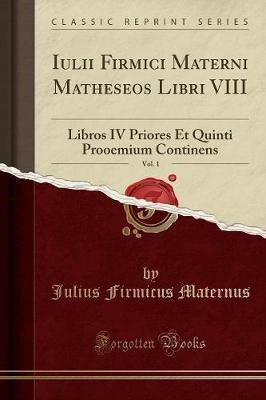– Anastasios
With Julius Firmicus Maternus we are dealing with a very interesting thinker, born in Sicily in the 4th century. According to the very scarce information we have about him, we may say that he was a man of many talents, having different careers: first as a lawyer, then as an astrologist and finally as Christian apologist. We own to him De errore profanarum religionum (Profane religions’ errors), a book in which he addressed the mistakes contained in pagan religions and defending the truth of Christian faith: “The work is valuable because it gives a picture of the character which the paganism of the later Roman Empire had taken, under the stress of the new spiritual needs aroused by contact with the religions of Egypt and the East. It aims, if one may judge from the mutilated introduction, at presenting from a philosophical and historical standpoint, reasons showing the superiority of Christianity over the superstitions and licentiousness of heathenism. In a general survey of pagan creeds and beliefs the author holds up to scorn the origin and practices of the Gentile cults. All its parts are not of equal merit or importance, from the purely historical standpoint. The first portion, in which the religions of Greece and the East are described, is merely a compilation from earlier sources, but in the latter section of the work, in which the mysteries of Eleusis, Isis, and especially Mithra are set forth in detail, with their system of curious passwords, formulae, and ceremonies, the author seems to speak from personal experience, and thus reveals many interesting facts which are not found elsewhere. The emperors are exhorted to stamp out this network of superstition and immorality, as a sacred duty for which they will receive a reward from God Himself, and ultimately the praise and thanks of those whom they rescue from error and corruption. The theory that the author of the Christian work was identical with Julius Firmicus Maternus Siculus, who wrote a work on astrology (De Nativitatibus sive Matheseos), assigned by Mommsen to the year 337 [“Hermes”, XXIX (1894), 468 sq.], is favourably received by some, as well because of the identity of names and dates, as because of similarities in style which they are satisfied the two documents exhibit. This theory of course supposes that the author wrote one work before, the other after, his conversion. Critical edition by Halm (Vienna, 1867) in “Corpus Scrip. Eccles. Lat.”, II. (Healy, P. (1909). Firmicus Maternus. In The Catholic Encyclopedia: http://www.newadvent.org/cathen/06080a.htm).
Even if this writer is not very famous for the common people, but there are some interesting studies on him and his apologetic book is still now in print in different languages: “Julius Firmicus Maternus, author of De Errore Profanarum Religionum and Mathesis, is an important but oftentimes overlooked writer from the middle of the fourth century. He is known to us only from the two works which he left behind, the former being a Christian polemic against pagan religion and the latter, a work he wrote while still a pagan, being on the subject of astrology…. The middle of the fourth century when Firmicus wrote his work, AD 346-350, was a time of religious change and struggle in the Roman Empire. Within Christianity there were still troubles over the issues which precipitated the Council of Nicea. Outside of the church, paganism, though on the defensive, was still strong. Legislation had been passed against the pagan cults but it was not being enforced. So, about AD 348, a Roman Senator, Julius Firmicus Maternus, wrote a letter Concerning the Error of Profane Religions to the Emperors Constans and Constantius. The first section of this work, chapters 1-17, presents the various gods of antiquity. Firmicus ridicules these by depicting the crimes and immorality of the gods, by showing that the pagan gods were nothing more than personified elements or processes of nature. His arguments are basically those found in previous Christian writers. In the last portion of this work, chapters 18-29, Firmicus relates the “passwords” used in the mystery cults for recognition and transmission of secret knowledge. Most of these “passwords,” which are preserved for us in Greek, contain motifs or words which are similar to motifs and words found in Christianity; e.g., rock, bridegroom, eucharist, redemption from suffering. Firmicus sees these as attempts of Satan to trick mortal man and keep him from believing in Christ. This, too, is a motif found in previous Christian writers. However, in spite of Firmicus’ Christian polemic, most scholars believe that Firmicus is very valuable and reliable as a source for the pagan beliefs of late antiquity. In addition to his value as a source of pagan religion, Firmicus is also very important to us for his statements concerning the relationship between church and state in the fourth century. In Firmicus, we find for the first time the articulation of the view that the Emperor is a servant of God whose purpose is to destroy paganism and all its visible forms. Firmicus also believes that forced conversion is beneficial to the individual. Although the pagans may now object to the forced used on them, after they are saved, they will thank the Emperor for forcing them to embrace Christianity. Firmicus’ views take on added significance when one realizes that he was probably representative of popular Christianity. As a recent convert, Firmicus may well represent what the average, patriotic Christian layman of the fourth century believed should be the relationship between Christianity and the Roman Empire.” (Oster, Richard Earl. Julius Firmicus Maternus: De errore profanarum religionum. Introduction, translation and commentary. (1971) Master’s Thesis, Rice University. https://hdl.handle.net/1911/89943).
Another Christian writer from the 4th century, a very turbulent but exciting time.


 Follow
Follow


